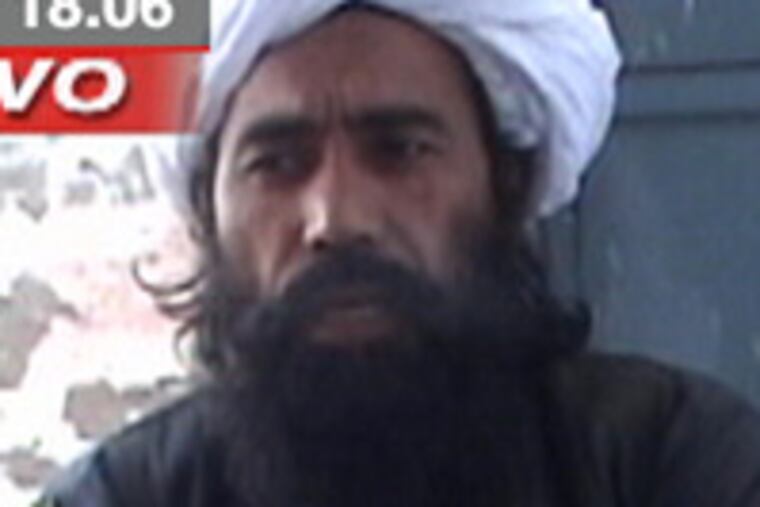A top Taliban figure is killed
Mullah Dadullah's death is considered a big setback, but his brutal tactics are expected to continue.

KABUL, Afghanistan - The Taliban movement suffered a significant setback with the death of its top operational commander, Mullah Dadullah, but the brutal tactics he pioneered have likely left a lasting imprint on the insurgency, military officials and analysts said yesterday.
Dadullah, one of the most senior Taliban figures to be killed by Western forces in more than five years of fighting, died Saturday in a U.S.-led military operation in Afghanistan's southern Helmand province, American and Afghan officials said.
Although subordinate to the movement's supreme leader, Mullah Omar, Dadullah was considered the commander in chief of Taliban forces, in charge of day-to-day military operations.
A flamboyant leader with one leg and a penchant for casting himself in Taliban recruiting videos, Dadullah had escaped death so many times that Afghan authorities displayed his blood-splattered corpse to reporters in the southern city of Kandahar. The body was wrapped in purple sheets, and bore bullet wounds to the head and torso.
Those shown the body confirmed a missing left leg. They also said his face was recognizable from his televised interviews, a departure from the secrecy practiced by other senior figures in the Taliban hierarchy.
Dadullah, one of the most feared and ruthless Taliban commanders, was believed to have been the driving force behind insurgents' adoption of Iraq-style tactics, such as suicide bombings, abductions, and assassination-style killings including beheadings - all of which increased sharply in the last year.
Analysts said that, even with Dadullah's death, Taliban fighters would press ahead with attacks, because they are the most successful way to fight NATO forces and intimidate the Afghan populace.
"All this is part of the repertoire now, and they will not change their minds as a result of Dadullah's elimination," said Hassan Abbas, a research fellow at the Kennedy School of Government at Harvard University.
Nonetheless, he and others characterized the death as a significant milestone in the Western-led coalition's battle against the Taliban, whose fighters have reorganized and regrouped after being toppled by a U.S.-led invasion in 2001.
The killing of Dadullah, thought to be in his 40s, was announced by Said Ansari, a spokesman for Afghanistan's intelligence service, and later confirmed by NATO's International Security Assistance Force.
Dadullah "will most certainly be replaced in time, but the insurgency has received a serious blow," a NATO statement said.
Afghan security forces also took part in the operation, which was launched when Dadullah "left his sanctuary," the coalition said without providing details.
Like other senior Taliban leaders, Dadullah was thought to move freely across the Afghan-Pakistani frontier, using border-straddling tribal areas as a staging ground.
Dadullah's replacement, almost certain to be an ethnic Pashtun as he was, will have to win the respect of various factions within the movement, a process that could take months and that could disrupt insurgent operations in the short term, several diplomats and military officials said.
Helmand province, the opium-producing heartland where Dadullah was killed, has been the scene of heavy fighting in recent weeks. NATO forces have launched a major offensive against the insurgents, but the Taliban has staged hit-and-run attacks against coalition troops, avoiding direct battlefield confrontations.
While NATO forces have been frustrated by their inability to flush out the Taliban, they have managed to track and kill important commanders. Until Dadullah's death, the most senior of those was Mullah Akhtar Mohammed Osmani, who was killed in an American air strike in December.
A veteran of mujaheddin battles against invading Russians in the 1980s, a conflict that cost him his leg, Dadullah came to prominence in the 1990s. He gained a reputation for military prowess, but also for acts of cruelty.
During the Taliban reign, he presided over the stoning of women accused of licentious behavior, public hangings, and revenge killings encompassing entire villages. He also was notorious for ordering the massacre of civilians from the Hazara ethnic group in the 1990s.
Afghan-Pakistani Border Clash
Pakistani and Afghan forces exchanged fire at their rugged border yesterday in their most serious skirmish in years. Pakistan claimed it killed six Afghan soldiers, but Afghanistan said just two Afghan civilians were killed.
Tension has been running high between Afghanistan and Pakistan, both key U.S. allies, over controlling their 1,510-mile shared border and stemming the flow of Taliban and al-Qaeda militants who stage cross-border attacks into Afghanistan.
A Pakistan army spokesman, Maj. Gen. Waheed Arshad, accused the Afghan army of firing at Pakistani posts. "This was unprovoked and without any reason," he said.
On the Afghan side, a Defense Ministry spokesman, Gen. Mohammad Zahir Azimi, accused Pakistani forces of crossing more than a mile into Afghanistan's Paktia province.
- Associated PressEndText